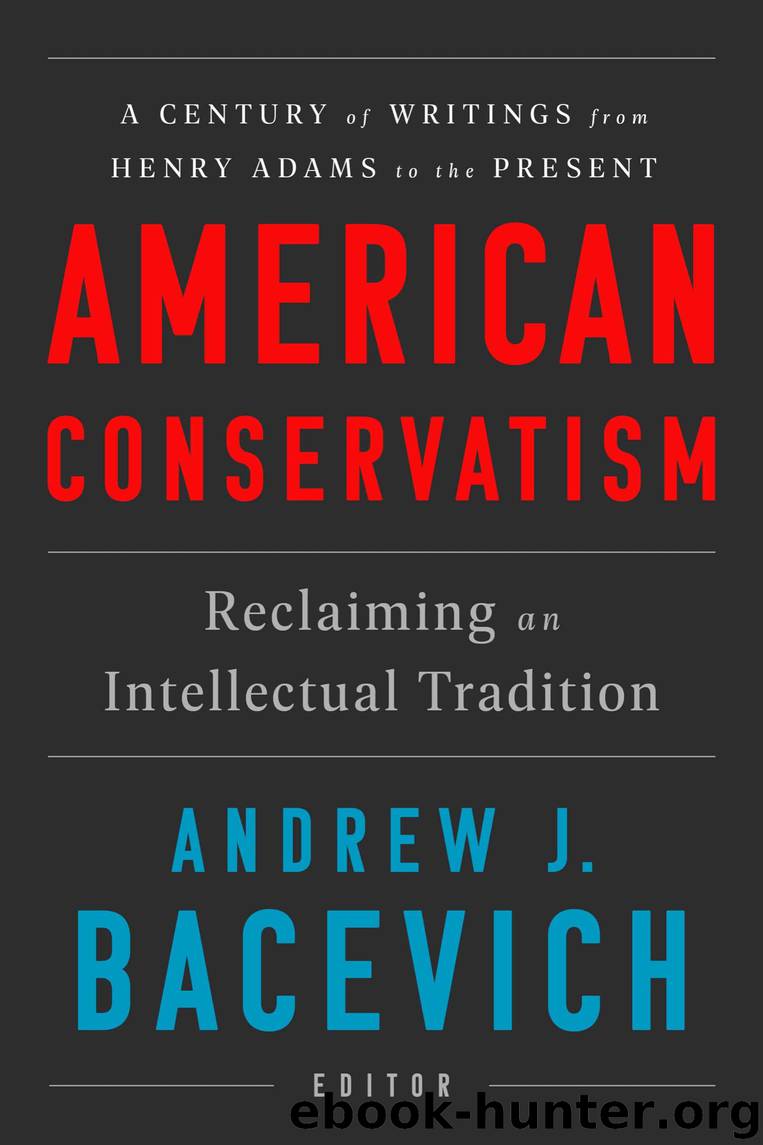American Conservatism by Andrew J. Bacevich

Author:Andrew J. Bacevich
Language: eng
Format: epub
Publisher: Library of America
Published: 2020-02-11T18:31:04+00:00
Albert Jay Nock
In intellectual circles, libertarians tend to be more passionate than numerous. In his day, Albert Jay Nock (1870–1945) was America’s foremost libertarian—although he preferred the term “philosophical anarchist”—and was as critical of twentieth-century American liberalism as he was of totalitarianism in its various forms.
FROM Our Enemy, The State
Three Indexes of State Power
IN THE United States at the present time, the principal indexes of the increase of State power are three in number. First, the point to which the centralization of State authority has been carried. Practically all the sovereign rights and powers of the smaller political units—all of them that are significant enough to be worth absorbing—have been absorbed by the federal unit; nor is this all. State power has not only been thus concentrated at Washington, but it has been so far concentrated into the hands of the Executive that the existing regime is a regime of personal government. It is nominally republican, but actually monocratic; a curious anomaly, but highly characteristic of a people little gifted with intellectual integrity. Personal government is not exercised here in the same ways as in Italy, Russia or Germany, for there is as yet no State interest to be served by so doing, but rather the contrary; while in those countries there is. But personal government is always personal government; the mode of its exercise is a matter of immediate political expediency, and is determined entirely by circumstances.
This regime was established by a coup d’Etat of a new and unusual kind practicable only in a rich country. It was effected, not by violence, like Louis-Napoleon’s, or by terrorism, like Mussolini’s, but by purchase. It therefore presents what might be called an American variant of the coup d’Etat.1 Our national legislature was not suppressed by force of arms, like the French Assembly in 1851, but was bought out of its functions with public money; and as appeared most conspicuously in the elections of November, 1934, the consolidation of the coup d’Etat was effected by the same means; the corresponding functions in the smaller units were reduced under the personal control of the Executive.2 This is a most remarkable phenomenon; possibly nothing quite like it ever took place; and its character and implications deserve the most careful attention.
A second index is supplied by the prodigious extension of the bureaucratic principle that is now observable. This is attested prima facie by the number of new boards, bureaux and commissions set up at Washington in the last two years. They are reported as representing something like 90,000 new employees appointed outside the civil service, and the total of the federal payroll in Washington is reported as something over three million dollars per month.3 This, however, is relatively a small matter. The pressure of centralization has tended powerfully to convert every official and every political aspirant in the smaller units into a venal and complaisant agent of the federal bureaucracy. This presents an interesting parallel with the state of things prevailing in the Roman Empire in the last days of the Flavian dynasty, and afterwards.
Download
This site does not store any files on its server. We only index and link to content provided by other sites. Please contact the content providers to delete copyright contents if any and email us, we'll remove relevant links or contents immediately.
| Anarchism | Communism & Socialism |
| Conservatism & Liberalism | Democracy |
| Fascism | Libertarianism |
| Nationalism | Radicalism |
| Utopian |
The Secret History by Donna Tartt(16606)
The Social Justice Warrior Handbook by Lisa De Pasquale(11485)
Thirteen Reasons Why by Jay Asher(7780)
This Is How You Lose Her by Junot Diaz(5753)
Weapons of Math Destruction by Cathy O'Neil(5029)
Zero to One by Peter Thiel(4816)
The Myth of the Strong Leader by Archie Brown(4785)
Promise Me, Dad by Joe Biden(4440)
Stone's Rules by Roger Stone(4412)
Beartown by Fredrik Backman(4403)
How Democracies Die by Steven Levitsky & Daniel Ziblatt(4392)
The Fire Next Time by James Baldwin(4336)
100 Deadly Skills by Clint Emerson(4070)
A Higher Loyalty: Truth, Lies, and Leadership by James Comey(4024)
Rise and Kill First by Ronen Bergman(4008)
The David Icke Guide to the Global Conspiracy (and how to end it) by David Icke(3875)
The Farm by Tom Rob Smith(3869)
Secrecy World by Jake Bernstein(3773)
The Doomsday Machine by Daniel Ellsberg(3725)
